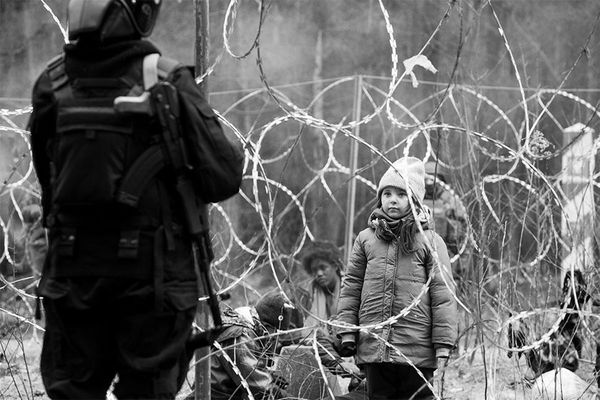Eye For Film >> Movies >> Green Border (2023) Film Review
Green Border
Reviewed by: Amber Wilkinson

You can feel white hot anger bubbling like magma just beneath the surface of Agnieszka Holland’s excoriating drama about the brutal situation for refugees on the Poland/Belrus border. No wonder then, perhaps, that when it was released in Poland the then-ruling Law and Justice (PiS) party responded with a hate campaign attacking the director. President Andrzej Duda compared it to Nazi propaganda and described it as “anti-Polish”. PiS even went as far as to try to force cinemas to show a 30-second propaganda film entitled Safe Poland before Green Border, though many refused.
The truth, as they say, hurts. Holland pulls no punches as she offers a multiple-perspective look at the brutal state of affairs that was created when Belarussian dictator Alexander Lukashenko lured refugees to his country’s border with Poland with talk of how easily they would be able to enter the European Union. The reality was the polar opposite as Polish border guards repeatedly forced them back across the border so that they became stuck in the inhospitable forest between the two countries, unable to proceed or return.

Holland and her co-writers Maciej Pisuk and Gabriela Lazarkiewicz avoid any of the sort of fairy tale gloss that Matteo Garrone brought to Io Capitano - which it premiered alongside in Venice. Instead they opt for a stark black and white docureal approach that refuses to do anything except look grim reality straight in the face. On one side of the equation, we see the viewpoint of some of those trying to make the crossing to a new life. Amina (Dalia Naous) and her husband Bashir (Jalal Altawil) have fled Syria with their young children and Bashir’s father (Mohamad Al Rashi) and are being confronted with unforgiving elements and the awful reality of the political situation along with Afghanistan refugee Leila (Behi Djanati Atai).
A second perspective is offered by Jan (Tomasz Włosok), one of the border guards being steeped in the demonising philosophy that the refugees “aren’t people, they’re live bullets”. His pregnant wife Kasia (Malwina Buss), however, increasingly prickles at his conscience. Rounding out the story is psychiatrist Julia (Maja Ostaszewska), who finds she can’t ignore the situation in her own backyard - something that is also brought home by recent documentary Forest, which plays like a factual companion piece to this. She joins up with sisters Marta (Monika Frajczyk) and Zuku (Jasmina Polak), who flout Polish laws to try to help those in need.
The consequences of dehumanising people are forcefully outlined, for example, in a sequence in which a pregnant woman is thrown unceremoniously over a fence by the border guards. We feel the intensity of the relationships forged on the road, spots of humanity in a sea of ignorance. Elsewhere, it’s the juxtaposition that makes you catch your breath, as the activists strive to help while the authorities wilfully ignore the refugees’ plight. Holland insists that we not only look but see with clarity what is going on and share her outrage. The result is essential, urgent and damning.
Reviewed on: 19 Mar 2024















